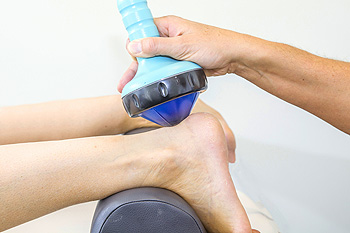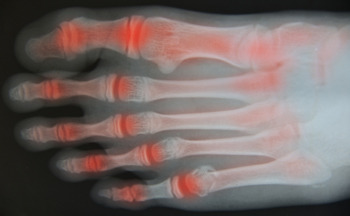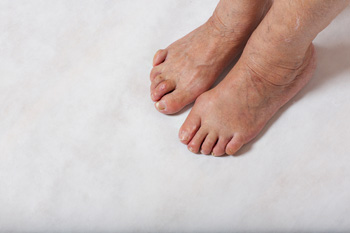Items filtered by date: March 2022
Where Are Plantar Warts Found?

A specific type of growth on the bottom of the foot is known as a plantar wart. It grows inward as a result of the constant pressure the feet endure from walking and standing for the majority of the day. It is known to be caused by the human papillomavirus (HPV), and is contagious. The virus can enter the body through a small break in the skin and can cause an infection. These warts can form in a variety of shapes and sizes and cause severe pain and discomfort. They appear to be thickened portions of skin with small blood vessels in the center, which appear as tiny black dots. If you think you may have plantar warts, it is strongly suggested that you see a podiatrist for a proper diagnosis and treatment solutions.
Plantar warts can be very uncomfortable. If you need your feet checked, contact our podiatrists from CNY Foot Surgery & Podiatry Care. Our doctors will assist you with all of your foot and ankle needs.
About Plantar Warts
Plantar warts are the result of HPV, or human papillomavirus, getting into open wounds on the feet. They are mostly found on the heels or balls of the feet.
While plantar warts are generally harmless, those experiencing excessive pain or those suffering from diabetes or a compromised immune system require immediate medical care. Plantar warts are easily diagnosed, usually through scraping off a bit of rough skin or by getting a biopsy.
Symptoms
- Lesions on the bottom of your feet, usually rough and grainy
- Hard or thick callused spots
- Wart seeds, which are small clotted blood vessels that look like little black spots
- Pain, discomfort, or tenderness of your feet when walking or standing
Treatment
- Freezing
- Electric tool removal
- Laser Treatment
- Topical Creams (prescription only)
- Over-the-counter medications
To help prevent developing plantar warts, avoid walking barefoot over abrasive surfaces that can cause cuts or wounds for HPV to get into. Avoiding direct contact with other warts, as well as not picking or rubbing existing warts, can help prevent the further spread of plantar warts. However, if you think you have developed plantar warts, speak to your podiatrist. He or she can diagnose the warts on your feet and recommend the appropriate treatment options.
If you have any questions please feel free to contact our office located in East Syracuse, NY . We offer the newest diagnostic and treatment technologies for all your foot and ankle needs.
Are Bunions Affecting Your Everyday Life?
Treating Heel Pain With Extracorporeal Shockwave Therapy
Extracorporeal Shockwave Therapy (ESWT) is an FDA-approved treatment for plantar fasciitis, the most common form of heel pain. ESWT delivers targeted high-energy sound waves to the injured and inflamed plantar fascia tissue. This process breaks up scar tissue and encourages the body to create new tissue cells which, in turn, stimulates healing and reduces pain. Acoustic wave therapy has been used for decades in shockwave lithotripsy—a treatment that breaks up kidney stones. ESWT is safe, non-invasive, and treatments generally take less than half an hour on each foot, with typically 3-5 sessions needed for many patients to begin to feel relief. If you have plantar fasciitis, contact a podiatrist to discuss whether you may be a good candidate for ESWT.
Shockwave therapy is a treatment commonly used to treat various injuries and conditions, particularly plantar fasciitis in the feet. To learn more, consult with our podiatrists from CNY Foot Surgery & Podiatry Care. Our doctors can provide the care you need to keep you pain-free and on your feet.
Shockwave Therapy
Shockwave therapy is a new treatment option designed to treat bone conditions such as tennis elbow, shoulder pain, and others. Shockwave therapy uses high intensity sound waves that are directed to the affected tissues of the body with pinpoint accuracy. The effects are very beneficial, leading to a production of collagen fibers, eliminating inflammation.
Who Benefits from Shockwave?
Shockwave is recommended for patients suffering from heel pain and associated problems. Heel pain is a common condition which can be caused by obesity, overexertion, and spending a substantial amount of time on hard floors with your feet exposed and unsupported.
Fast and Easy
The therapy is actually a simple process that can leave patients feeling better the very next day. Shockwave therapy is not as dramatic as it sounds. It enables more blood flow to effected areas, addressing the source of the problem and allowing treatment to last for a long time.
Treatment & Recovery Time
Shockwave treatment will enable your feet to recover quickly. This is especially important since surgery is not required. It is cost effective and does not require the use of anesthesia. This treatment is a better option to surgery, since it is proven safe.
If you have any questions, please feel free to contact our office located in East Syracuse, NY . We offer the newest diagnostic and treatment technologies for all your foot and ankle needs.
Psoriatic Arthritis and Foot Care
One of the main targets of psoriatic arthritis (PsA) is your feet and ankles. It can cause swelling, inflammation, stiffness, and difficulty walking, as well as other symptoms. It can also result in a condition known as sausage toes (where the entire toe swells up), heel pain due to the Achilles tendon becoming inflamed, flattening of the arch, and painful calluses or sores over the joints. Because these ailments can be very painful, the tendency is for the sufferer to cease activity, which can actually make the condition worse. Fortunately, you can help to manage these symptoms by changing the type of shoes you wear, doing exercises to strengthen and stretch the feet, and taking non-steroidal anti-inflammatory medication. Anyone with psoriatic arthritis that has severely affected their feet, ankles, and/or toes, would be wise to begin regular visits with a podiatrist who can determine the appropriate course of treatment.
Arthritis can be a difficult condition to live with. If you are seeking treatment, contact our podiatrists from CNY Foot Surgery & Podiatry Care. Our doctors can provide the care you need to keep you pain-free and on your feet.
Arthritic Foot Care
Arthritis is a joint disorder that involves the inflammation of different joints in your body, such as those in your feet. Arthritis is often caused by a degenerative joint disease and causes mild to severe pain in all affected areas. In addition to this, swelling and stiffness in the affected joints can also be a common symptom of arthritis.
In many cases, wearing ill-fitting shoes can worsen the effects and pain of arthritis. Wearing shoes that have a lower heel and extra room can help your feet feel more comfortable. In cases of rheumatoid arthritis, the arch in your foot may become problematic. Buying shoes with proper arch support that contour to your feet can help immensely.
Alleviating Arthritic Pain
- Exercises that stretch the foot can prevent further pain and injury and increase mobility
- Most of the pain can be alleviated with anti-inflammatory drugs, heat, and topical medications
- Massages can help temporarily alleviate pain.
It is best to see your doctor for the treatment that is right for your needs and symptoms. Conditions vary, and a podiatrist can help you determine the right method of care for your feet.
If you have any questions, please feel free to contact our office located in East Syracuse, NY . We offer the newest diagnostic tools and technology to treat your foot and ankle needs.
What Is a Hammertoe?
A hammertoe is when a toe joint (usually the second or middle toe joint) points up instead of lying flat and causes the toe to look like a hammer. This condition can be painful and can lead to difficulty walking. The affected joint often gets rigid, the joint stiffens, sometimes to non-movement. Sometimes a corn or callus may develop on the joint and can cause pain and swelling on the top of the bent toe. This affliction can be caused by weak foot or leg muscles which lead to the tendon pulling up the toe in an abnormal position. Hammertoes are more apt to happen to those who wear high heels or shoes that do not properly support the feet. However, foot type at birth, those with neuromuscular disease, and trauma may predispose one to develop this joint deformity as well. If you think you have symptoms of a hammertoe, it is recommended that you see a qualified podiatrist as soon as possible for proper diagnosis and treatment.
Hammertoe
Hammertoes can be a painful condition to live with. For more information, contact our podiatrists from CNY Foot Surgery & Podiatry Care. Our doctors will answer any of your foot- and ankle-related questions.
Hammertoe is a foot deformity that affects the joints of the second, third, fourth, or fifth toes of your feet. It is a painful foot condition in which these toes curl and arch up, which can often lead to pain when wearing footwear.
Symptoms
- Pain in the affected toes
- Development of corns or calluses due to friction
- Inflammation
- Redness
- Contracture of the toes
Causes
Genetics – People who are genetically predisposed to hammertoe are often more susceptible
Arthritis – Because arthritis affects the joints in your toes, further deformities stemming from arthritis can occur
Trauma – Direct trauma to the toes could potentially lead to hammertoe
Ill-fitting shoes – Undue pressure on the front of the toes from ill-fitting shoes can potentially lead to the development of hammertoe
Treatment
Orthotics – Custom made inserts can be used to help relieve pressure placed on the toes and therefore relieve some of the pain associated with it
Medications – Oral medications such as anti-inflammatories or NSAIDs could be used to treat the pain and inflammation hammertoes causes. Injections of corticosteroids are also sometimes used
Surgery – In more severe cases where the hammertoes have become more rigid, foot surgery is a potential option
If you have any questions please contact our office located in East Syracuse, NY . We offer the newest diagnostic and treatment technologies for all your foot and ankle needs.
What You Should Know if You Have Heel Pain
If you have heel pain, you may have come across the medical term plantar fascia. This is a strong, fairly inflexible connective tissue on the bottom of the foot that connects the heel bone with the toes. When this tissue becomes damaged or torn, it is known as plantar fasciitis, a painful inflammation of the plantar fascia. There is a good chance that your heel pain may be caused by plantar fasciitis, as this is the most common form of heel pain. What caused your plantar fasciitis? Perhaps you run or walk quite a bit or have the type of job that requires you to stand for all or most of the day. Maybe you regularly wear flip-flops, high heels or other footwear that does not offer adequate support or cushioning. Arthritis can contribute to the development of plantar fasciitis, as well as tight calf muscles, high arches, flat feet, or other conditions you may have that cause an imbalance in the biomechanics of your feet. You may even be pregnant or carrying some extra weight, which can stress the plantar fascia. Whatever the reason is for your heel pain, you should know that help is available. You don’t need to learn to live with heel pain, especially if it is caused by plantar fasciitis. Podiatrists treat people with plantar fasciitis every day, and can offer you various forms of treatment to provide the relief you are looking for.
Plantar fasciitis is a common foot condition that is often caused by a strain injury. If you are experiencing heel pain or symptoms of plantar fasciitis, contact our podiatrists from CNY Foot Surgery & Podiatry Care. Our doctors can provide the care you need to keep you pain-free and on your feet.
What Is Plantar Fasciitis?
Plantar fasciitis is one of the most common causes of heel pain. The plantar fascia is a ligament that connects your heel to the front of your foot. When this ligament becomes inflamed, plantar fasciitis is the result. If you have plantar fasciitis you will have a stabbing pain that usually occurs with your first steps in the morning. As the day progresses and you walk around more, this pain will start to disappear, but it will return after long periods of standing or sitting.
What Causes Plantar Fasciitis?
- Excessive running
- Having high arches in your feet
- Other foot issues such as flat feet
- Pregnancy (due to the sudden weight gain)
- Being on your feet very often
There are some risk factors that may make you more likely to develop plantar fasciitis compared to others. The condition most commonly affects adults between the ages of 40 and 60. It also tends to affect people who are obese because the extra pounds result in extra stress being placed on the plantar fascia.
Prevention
- Take good care of your feet – Wear shoes that have good arch support and heel cushioning.
- Maintain a healthy weight
- If you are a runner, alternate running with other sports that won’t cause heel pain
There are a variety of treatment options available for plantar fasciitis along with the pain that accompanies it. Additionally, physical therapy is a very important component in the treatment process. It is important that you meet with your podiatrist to determine which treatment option is best for you.
If you have any questions, please feel free to contact our office located in East Syracuse, NY . We offer the newest diagnostic and treatment technologies for all your foot care needs.








